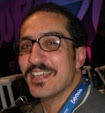Wednesday, June 14, 2006
Monday, June 12, 2006
Digital Objects & the Management of Information
Oxford Internet Institute - Digital Objects and the Management of Information
Live event at 13:30 - 17:30 on Tuesday 20 June 2006
Webcast at http://webcast.oii.ox.ac.uk/
Live event at 13:30 - 17:30 on Tuesday 20 June 2006
Webcast at http://webcast.oii.ox.ac.uk/
Sunday, June 11, 2006
Take Any 3 Objects
This is one of the more thought provoking passages in Baykam's book...it appears on page 272:
Please name any three objects. Anything. Here, I am writing spontaneosly. Telephones, little rocks, and sand, ... or an arm chair. I can put 15 telephones hanging with transparent ropes from the ceiling, I can put sand on the floor, an arm chair in the middle and surrond the arm chair with little rocks. Or name any other things: 10 glasses, five filled with water, five empty, flowers on the ceiling and kitschy lamps making shadows of the glasses! Anything, you name it! There will always be a critic ready to philosophize about "the work" in 60 pages!
FOUND OBJECT TS0003 [video]:
The Cut-Ups - William S. Burroughs
Please name any three objects. Anything. Here, I am writing spontaneosly. Telephones, little rocks, and sand, ... or an arm chair. I can put 15 telephones hanging with transparent ropes from the ceiling, I can put sand on the floor, an arm chair in the middle and surrond the arm chair with little rocks. Or name any other things: 10 glasses, five filled with water, five empty, flowers on the ceiling and kitschy lamps making shadows of the glasses! Anything, you name it! There will always be a critic ready to philosophize about "the work" in 60 pages!
FOUND OBJECT TS0003 [video]:
The Cut-Ups - William S. Burroughs
Friday, June 09, 2006
Monkeys' Right To Paint
I've started looking into "new" material that can feed into our project.
One way to go forward is to go backwards. So I want to take the next few days to look at some historical contexts for found objects in art. There's plenty of literature about this, of course. I don't want to be too discriminate at this stage, so I've selected some books to start my archaeological dig.
The first is by Turkish artist Bedri Baykam. It's called Monkeys' Right to Paint and the Post-Duchamp Crisis. I deliberately avoided going to the obvious academic publications by art historians published in the UK or USA. Still I'm surprised to see that some things are still inevitable. From Duchamp we must get to Fluxus through Dada, collage, Warhol, and Beuys, among others.
The idea of ready-mades is entrenched in happenings.
Baykam points out that there are five generations of ready-made-makers. Are we the sixth (or seventh) generation? And who belongs to which generation?
Do I believe that art is dead? Is it useful to think this way at all?
I particularly like this quotation attributed to Salvador Dali: "The first man to compare the cheeks of a young woman to a rose was obviously a poet; the first to repeat it was possibly an idiot."

Here's Baykam: "The text is the major weapon that keeps the Western capitalist art market from collapsing. Had the text not existed, the financial crisis of the contemporary art scene would have been much more dramatic."
Kunst = Kapital.
FOUND OBJECT TS0001 [audio]:
"JA JA JA JA JA, NEE NEE NEE NEE NEE" - Joseph Beuys (1968)
FOUND OBJECT TS0002 [audio]:
In Memoriam George Maciunas - Nam June Paik + Beuys (1978)
One way to go forward is to go backwards. So I want to take the next few days to look at some historical contexts for found objects in art. There's plenty of literature about this, of course. I don't want to be too discriminate at this stage, so I've selected some books to start my archaeological dig.
The first is by Turkish artist Bedri Baykam. It's called Monkeys' Right to Paint and the Post-Duchamp Crisis. I deliberately avoided going to the obvious academic publications by art historians published in the UK or USA. Still I'm surprised to see that some things are still inevitable. From Duchamp we must get to Fluxus through Dada, collage, Warhol, and Beuys, among others.
The idea of ready-mades is entrenched in happenings.
Baykam points out that there are five generations of ready-made-makers. Are we the sixth (or seventh) generation? And who belongs to which generation?
Do I believe that art is dead? Is it useful to think this way at all?
I particularly like this quotation attributed to Salvador Dali: "The first man to compare the cheeks of a young woman to a rose was obviously a poet; the first to repeat it was possibly an idiot."

Here's Baykam: "The text is the major weapon that keeps the Western capitalist art market from collapsing. Had the text not existed, the financial crisis of the contemporary art scene would have been much more dramatic."
Kunst = Kapital.
FOUND OBJECT TS0001 [audio]:
"JA JA JA JA JA, NEE NEE NEE NEE NEE" - Joseph Beuys (1968)
FOUND OBJECT TS0002 [audio]:
In Memoriam George Maciunas - Nam June Paik + Beuys (1978)
Subscribe to:
Posts (Atom)
